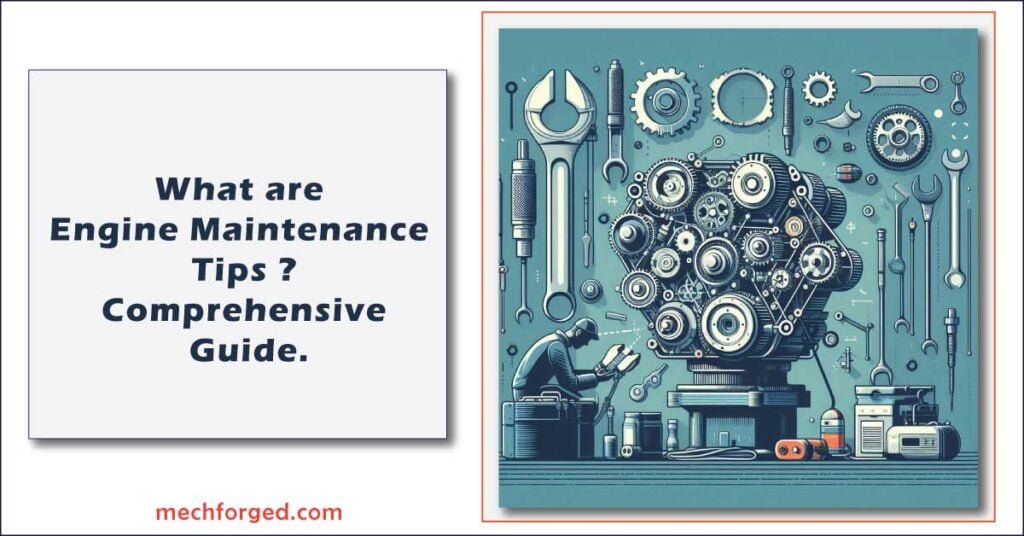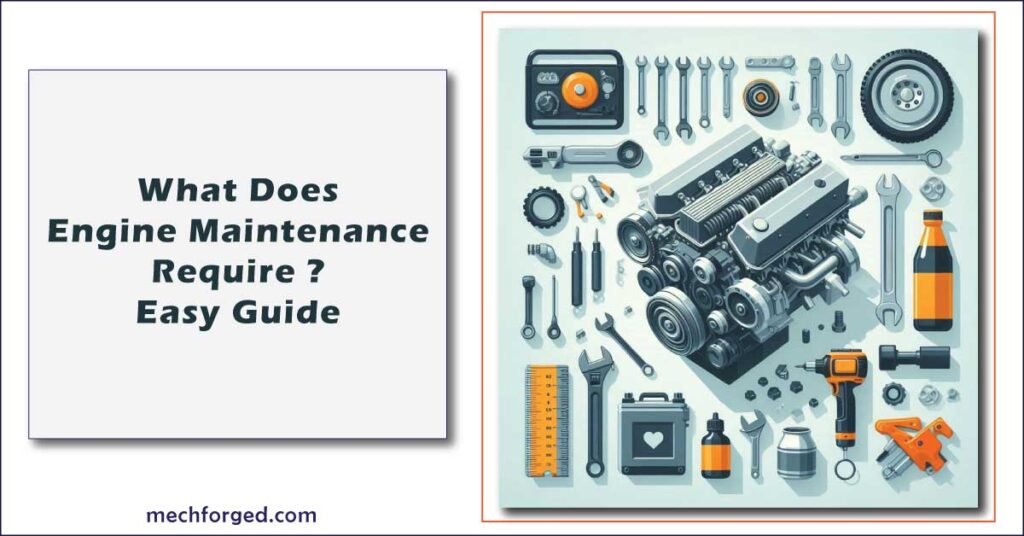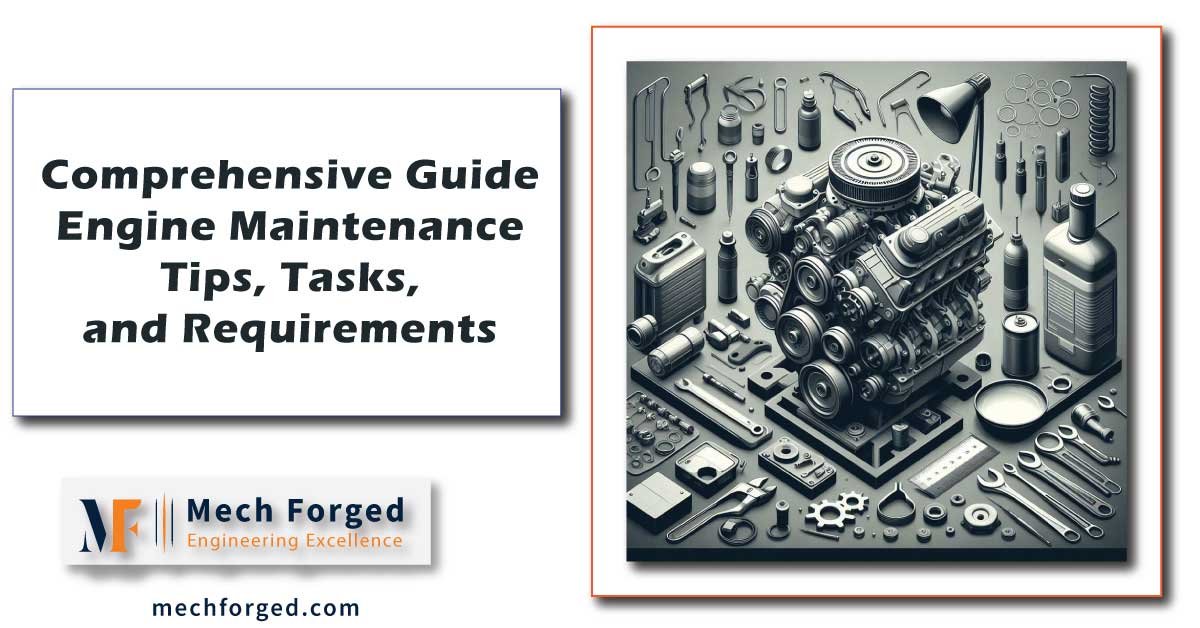That is why it is very important always do proper servicing on the engine in your car because it in fact is the heart of your vehicle. Learning the basic mechanics of an automobile engine is very important and this can be achieved by following simple tasks such as oil changes, regular inspections among others. This comprehensive guide gives all the information that is necessary to know about how to take proper care of your engine together all your necessary tips as well as the step by step process that is involved in the process of engine maintenance.
What is Engine Maintenance?
Engine maintenance involves the regular examination, repair, and care of the engine of a particular car or mechanical equipment with an aim of maximizing on its efficiency as well as durability. This process is quite vital when it comes to avoiding the breakdowns of vehicles, improving the fuel consumption and also safety. Ultimate engine care entails a number of processes and tests and that keep the engine running as it is supposed to, all the time.
The Importance of Regular Engine Maintenance
Easy servicing of an engine is as follows; First of all, it increases the engine’s service lifespan. With small problems detected and solved at an early stage, you will avoid severs damages or having to invest in an entire engine overhaul. Secondly, through a proper and regular maintenance, one may find that his or her fuel consumption is enhanced. Regular maintenance of an engine leads to efficiency of performance and reduced fuel consumption henceforth general saving. Lastly, it ensures safety. Such failures are dangerous because of a car’s usage, and one typically does not expect an engine that has not been regularly maintained to give out while the car is in use.
Key Components of Engine Maintenance
Engine maintenance includes several critical tasks. These tasks ensure that all parts of the engine are functioning correctly and efficiently. Here are the main components:
Oil Changes : Regular oil changes are vital. Oil lubricates the engine’s moving parts, reducing friction and preventing wear and tear. Over time, oil breaks down and becomes less effective, so it needs to be replaced regularly.
Air Filter Replacement : The air filter prevents dirt and debris from entering the engine. A clogged air filter can reduce engine performance and efficiency. Replacing the air filter as recommended by your vehicle’s manufacturer is crucial.
Spark Plug Inspection : Spark plugs ignite the air-fuel mixture in the engine’s cylinders. Worn or dirty spark plugs can cause engine misfires, poor fuel economy, and difficulty starting the engine. Inspecting and replacing spark plugs when necessary is a key part of engine maintenance.
Benefits of Adhering to an Engine Maintenance Schedule
Following a regular machine conservation schedule offers multitudinous benefits. originally, it enhances the trustability of your vehicle. You’re less likely to witness unanticipated breakdowns if your machine is well- maintained. Secondly, it maintains the vehicle’s resale value. A auto with a documented history of regular conservation is more seductive to implicit buyers. Eventually, it contributes to environmental protection. A duly maintained machine runs more efficiently, producing smaller emigrations and reducing your carbon footmark.

What are Engine Maintenance Tips ?
Maintaining your engine is crucial for the performance and longevity of your vehicle. By following these essential engine maintenance tips, you can keep your engine in excellent condition, avoid costly repairs, and ensure a smooth driving experience.
1. Regularly Check and Change the Engine Oil
Oil painting is the lifeblood of your machine. It lubricates the moving corridor, reduces disunion, and helps dissipate heat. Over time, machine oil painting breaks down and loses its effectiveness. It can also come polluted with dirt, debris, and essence patches from the machine. Regularly checking your oil painting position and changing it according to the manufacturer’s recommendations is one of the most important effects you can do to maintain your engine.However, consult your vehicle’s proprietor’s primer, If you are doubtful about when to change your oil painting. generally, it should be changed every 3,000 to 5,000 long hauls, depending on your driving conditions.
2. Pay Attention to the Cooling System
Cooling system ensure that your engine do not over heat through circulation of coolant through the engine and the radiator. The coolant may deteriorate over some time, the system may develop leakage or full blockage at one time. In order keep your cooling system functional, make sure that the coolant level is always checked and filled up whenever it is low. Another thing is that as a rule, it is required to flush and refill the cooling system every 30,000miles or as it is mentioned by the manufacturer of a certain model of cars.
3. Inspect and Replace Worn Engine Belts and Hoses
Belts and hoses play pivotal places in your machine’s operation. The timing belt, for case, synchronizes the movement of the machine’s faucets and pistons.However, it can beget severe machine damage, If it breaks. also, the windy belt drives colorful factors like the alternator and power steering pump. Hoses carry fluids to different corridor of the machine, similar as the radiator and energy injectors. Regularly examining these belts and hoses for signs of wear and tear, cracking, or rasping, and replacing them as necessary, can help major machine issues and keep your vehicle running easily.
4. Keep the Air Filter Clean
The air sludge is responsible for precluding dirt, dust, and debris from entering the machine. A dirty or clogged air sludge can reduce machine effectiveness, beget poor energy frugality, and indeed lead to machine damage over time. It’s essential to check your air sludge regularly and replace it as demanded. A good rule of thumb is to check the air sludge every 12,000 to 15,000 long hauls, or more constantly if you drive in fine or weakened areas. A clean air sludge ensures your machine gets the proper tailwind it needs to operate efficiently.
5. Monitor the Fuel System
Your machine’s energy system, including the energy pump, energy injectors, and energy sludge, plays a vital part in delivering energy to the machine. Over time, pollutants can make up in the energy system, leading to reduced performance and effectiveness. To keep your energy system in top shape, use high- quality energy and consider adding a energy system cleanser every many thousand long hauls. also, replacing the energy sludge according to the manufacturer’s guidelines helps insure a steady and clean energy inflow to your machine, precluding clogs and icing optimal combustion.
6. Check the Battery and Electrical System
Your machine relies on a healthy battery and electrical system to start and run efficiently. A weak or failing battery can beget starting issues and put fresh strain on the machine. Regularly check the battery outstations for erosion, insure the battery is duly charged, and replace it when it shows signs of aging or weakness. also, check the electrical connections and alternator to insure they are performing rightly. Keeping the electrical system in good condition is crucial to dependable machine performance.
7. Keep an Eye on Engine Warning Lights
The current models of vehicles contain sophisticated self-diagnostic systems that will be able to analyze several features of the functioning of the engine. Here is a short list of some of the warning signs that any driver should pay attention to: So, if you see a light on your dashboard blinking, for example the check engine light it is important that you take action. One can presume that by ignoring the warning lights, he or she will face more severe issues and greater expenditures for the vehicle’s repair. To do this, one has to rush the car to a mechanic or use an OBD-II to examine the problem and rectify it before it gets out of hand.
8. Use the Right Type of Fuel
Using the correct type of fuel for your engine is vital for its performance and longevity. Check your vehicle’s owner’s manual for the recommended fuel type, whether it’s regular unleaded, premium, or diesel. Using the wrong type of fuel can cause engine knocking, reduce fuel efficiency, and potentially damage the engine over time. Additionally, avoid using low-quality or contaminated fuel, which can harm the engine and fuel system components.
9. Avoid Hard Driving Habits
Your driving habits can significantly impact the lifetime of your machine. Hard driving, similar as rapid-fire acceleration, high- speed driving, and inordinate footling, can put gratuitous strain on the machine. To maintain your machine’s health, borrow smoother driving habits. Accelerate gradationally, avoid high pets for extended ages, and limit footling time. These practices reduce wear and tear and gash on the machine and contribute to better energy frugality.
10. Schedule Regular Engine Tune-Ups
An engine tune-up entails numerous procedures that are essential in checking on and rectifying all parts of the engine so that they be in their right conditions. To some extent, that is true: current difficulties, if detected during routine maintenance, may become critical and require more complex solutions if ignored. Some of things that your mechanic is likely going to check include spark plugs, ignition system, fuel injectors and among other things. Regular auto tune-up as per the manufacturer’s recommended time table make sure that the engine is always at its best and it has a longer life span.
Mechanical Maintenance: Types and Techniques are essential for ensuring the longevity and efficiency of equipment. Using the right Mechanical Tools and Their Uses in maintenance routines can significantly impact performance. For a deeper understanding of these critical aspects, read the full post and enhance your knowledge of effective maintenance strategies.

What Does Engine Maintenance Require ?
Maintaining an machine is vital for the health and life of your vehicle. Proper conservation ensures that your machine runs efficiently, prevents expensive breakdowns, and prolongs the life of your auto. Then are ten essential points that outline what machine conservation requires
1. Regular Oil Changes
One of the most critical aspects of machine conservation is regularly changing the machine oil painting. oil painting lubricates the machine’s internal corridor, reduces disunion, and prevents overheating. Over time, oil painting breaks down and becomes less effective, so it’s essential to replace it according to the manufacturer’s recommended intervals, generally every 3,000 to 5,000 long hauls.
2. Coolant System Maintenance
It is also important to control the engine temperature so that the car will not overheat and the cooling system has the function to make it. The coolant should be checked frequently and should be as clean as possible; it is wise to observe the coolant level. There is also a need to clean and restore the cooling systems at certain time intervals; preferably, at every 30,000 miles.
3. Air Filter Replacement
The air sludge prevents dirt and debris from entering the machine, which can beget damage and reduce effectiveness. A congested or dirty air sludge can lead to poor energy frugality and reduced machine performance. Replacing the air sludge every 12,000 to 15,000 long hauls, or as demanded, is an important part of machine conservation.
4. Fuel System Inspection
The energy system, including the energy pump, energy injectors, and energy sludge, plays a vital part in delivering the correct quantum of energy to the machine. Over time, energy system factors can come congested or damaged, leading to reduced performance. Regular examination and conservation of the energy system, including using high- quality energy and replacing the energy sludge, are necessary to keep the machine running easily.
5. Timing Belt Replacement
The timing belt is another very important belt that has to do with the rotation of the camshaft and crankshaft so that the valves would open and close as they should. A damaged or worn out timing belt results to serious issues on the engine. As for the recommendations from the car manufacturers, they recommend the timing belt to be replaced every 60,000 to 100000 miles is for the good health of the engine.
6. Battery and Electrical System Check
The regular checks on the amount of charge in the battery, the cleanliness of the terminals, and the tightness of electric connections keep off starting troubles and other electrical concerns that may harm the operation of the engine. Regularly checking the battery’s charge, cleaning the terminals, and ensuring that the electrical connections are secure helps prevent starting issues and other electrical problems that can affect engine performance.
7. Spark Plug Inspection and Replacement
Spark entrapments enkindle the air- energy admixture in the machine’s cylinders, furnishing the power demanded to run the machine. Worn or defective spark entrapments can lead to misfires, poor energy frugality, and reduced machine performance. examining and replacing spark entrapments according to the manufacturer’s schedule, generally every 30,000 to 50,000 long hauls, is pivotal for maintaining machine effectiveness.
8. Belts and Hoses Maintenance
Belts and hoses play essential places in the operation of colorful machine factors, similar as the alternator, water pump, and power steering pump. Over time, belts can wear out and hoses can crack or blunder. Regular examination and relief of belts and hoses as demanded are important to help machine failure and insure smooth operation.
9. Exhaust System Inspection
The exhaust system removes dangerous feasts from the machine and reduces noise. A damaged or clogged exhaust system can lead to poor machine performance, increased emigrations, and indeed machine damage. Regularly examining the exhaust system for leaks, erosion, and damage is a crucial part of machine conservation.
10. Regular Engine Tune-Ups
An machine tune- up involves checking and conforming colorful factors to insure the machine is running optimally. This may include conforming the ignition timing, examining the energy and air systems, and checking the machine’s overall condition. Regular tune- ups help identify implicit issues before they come serious problems, keeping the machine in top condition.
The Role of Regular Inspections in Engine Maintenance
Regular examinations are a vital part of machine conservation. During these examinations, mechanics check for signs of wear and tear, leaks, or other issues that could affect machine performance. They check factors similar as belts, hoses, and seals, and insure that everything is performing rightly. Beforehand discovery of problems through regular examinations can help more significant issues down the road, saving you time and plutocrat on repairs.
The Importance of Following the Manufacturer’s Maintenance Schedule
Every vehicle comes with a manufacturer- recommended conservation schedule, which outlines the specific services and examinations needed at colorful avail intervals. Following this schedule is essential for keeping your machine in top condition. It ensures that all necessary conservation tasks are performed at the right time, precluding problems before they do. Neglecting this schedule can lead to machine damage, reduced performance, and expensive repairs. Always relate to your vehicle’s proprietor’s primer for the recommended conservation intervals and services.
Conclusion About Engine Maintenance
Maintaining your engine is not just about keeping your vehicle running; it’s about ensuring safety, efficiency, and longevity. By following the recommended maintenance schedule, performing regular checks, and understanding the key tasks involved, you can protect your engine from wear and tear, enhance its performance, and extend its lifespan. Prioritizing engine maintenance today can save you from major issues down the road, ensuring that your vehicle remains reliable and efficient for years to come.

